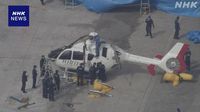A tragic accident involving a medical transport helicopter has left three people dead and three others injured off the coast of Isahaya City in Nagasaki Prefecture. The helicopter, which was transporting patients and medical staff from Tsushima Airport to a hospital in Fukuoka City, capsized on April 6, 2025, raising serious concerns about the safety of air medical services in the region.
During a regular press conference on April 10, 2025, Nagasaki University President Takeharu Nagayasu expressed his profound sadness over the loss of Dr. Wataru Arakawa, a 34-year-old neurosurgeon and graduate of the university’s Faculty of Medicine. "It is with deep sorrow that I acknowledge the passing of Dr. Arakawa, a talented physician from our university," Nagayasu stated. He noted that he had offered a moment of silent prayer for the deceased doctor at the beginning of a lecture for new students just two days prior to the press conference.
The helicopter accident occurred when the aircraft was flying at an altitude of approximately 150 meters. According to reports from the pilot, who was interviewed by officials from ES・G・C Saga Aviation, a strange noise was heard coming from the rear of the helicopter. The pilot described the sound as "a noise like metal rubbing, like something being sucked into a toilet, a sound I had never heard before." This alarming noise prompted the pilot to focus on controlling the aircraft, as it began to lose altitude immediately after.
Following the incident, the helicopter was salvaged on April 10, 2025. Investigators from the Japan Transport Safety Board revealed that the rotor was tilted to the right when the helicopter landed on the water, indicating a possible loss of control. As the investigation continues, officials are committed to determining the precise cause of the accident.
In the wake of this tragedy, President Nagayasu emphasized the critical role that helicopters play in regional healthcare, stating, "Helicopters are very important for regional medicine; however, safety must always come first. I believe a thorough investigation is essential to ensure such accidents do not happen again." He expressed hope that the deceased doctor’s aspirations for improving medical transport would not be overshadowed by this unfortunate event.
Dr. Arakawa was remembered by colleagues as an exceptionally skilled and promising neurosurgeon. One doctor from the same hospital remarked, "He was an extremely talented physician with a bright future ahead of him." The loss of such a promising figure has left a significant void in the medical community, underscoring the importance of safety in medical transport.
The accident has sparked discussions about the safety protocols surrounding air medical services in Japan. Many are calling for stricter regulations and better training for pilots, especially in emergency situations. As the investigation unfolds, stakeholders in the healthcare and aviation sectors are urged to collaborate on improving safety measures to prevent future tragedies.
In conclusion, the loss of Dr. Arakawa and the other victims of this helicopter accident serves as a grim reminder of the inherent risks associated with medical transport. As the community mourns, there is a collective hope that this tragedy will lead to meaningful changes in safety practices, ensuring that those who rely on air medical services can do so with confidence in their safety.





